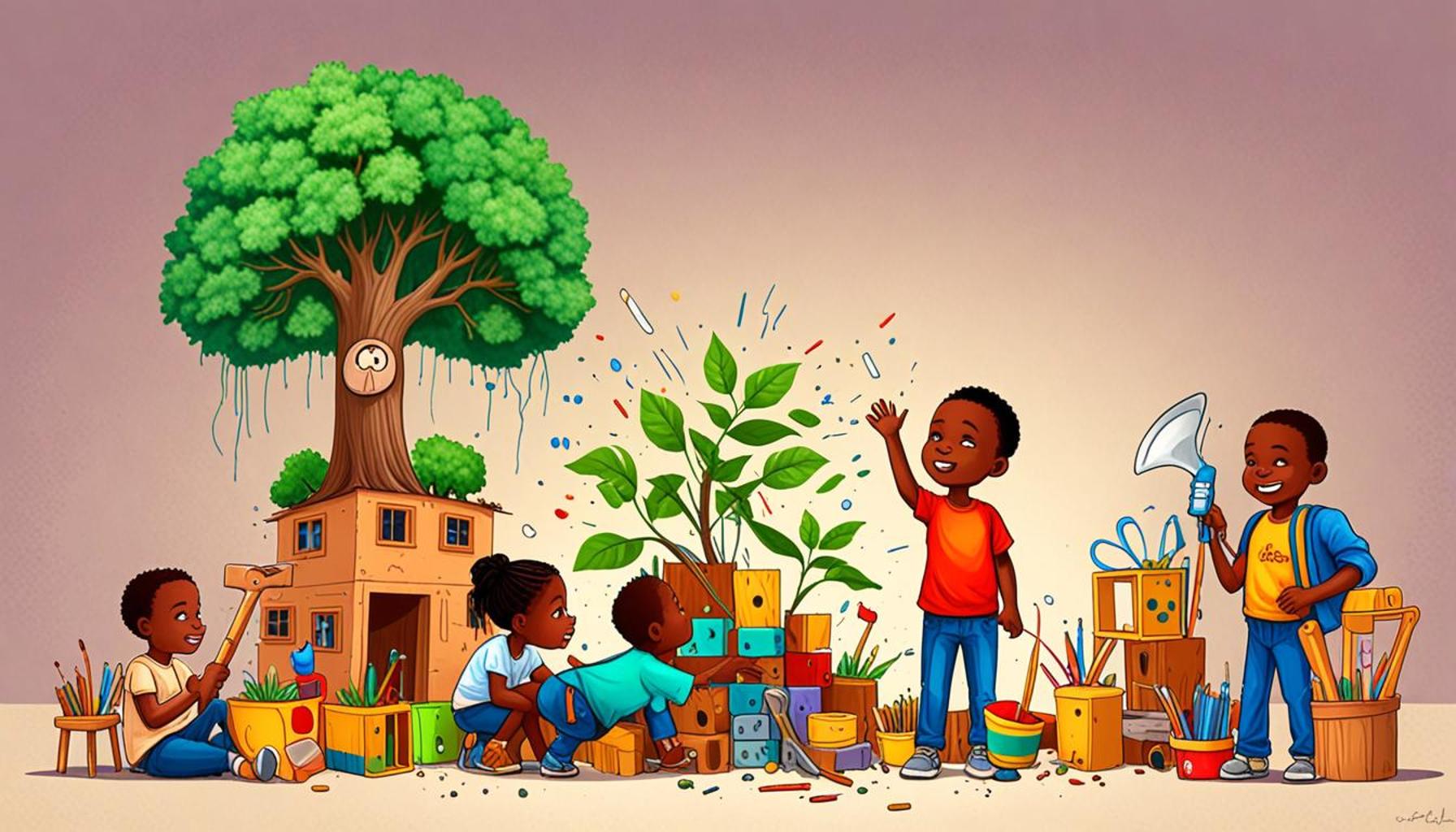Building Resilience in Children: Growth Mindset Methods for Nigerian Parents

Embracing Resilience through Intentional Parenting
Raising resilient children in today’s fast-paced world requires intentional effort. Nigerian parents are uniquely positioned to foster this resilience through the application of growth mindset methods. This approach encourages children to embrace challenges, learn from setbacks, and ultimately develop a strong sense of self-worth. Unlike traditional views that often equate success with inherent talent, the growth mindset teaches that effort and learning can pave the way for achievement.
Key strategies for nurturing resilience include:
- Encouragement of Effort: It is crucial to praise children for their hard work and dedication rather than merely their innate abilities. For instance, praising a child for their diligent preparation for an exam, regardless of the outcome, helps them see the value in persistence. This approach can be particularly powerful in the Nigerian context, where students often face intense pressure to excel academically.
- Modeling a Growth Mindset: Parents can have a profound influence by sharing their own experiences with setbacks and the lessons learned from them. When a parent discusses their challenges—be it in their career or personal pursuits—it demystifies failure for children, showing that it is a natural part of growth. This can be particularly relatable through storytelling, a cherished cultural practice in Nigeria that often highlights the journey rather than just the destination.
- Promoting Independent Problem-Solving: Allowing children to tackle age-appropriate challenges on their own encourages autonomy and resilience. For instance, a child could be guided to find a solution to a conflict with a friend instead of the parent stepping in right away. Providing a safe space for children to experiment with different solutions nurtures their confidence and critical thinking skills.
In a country like Nigeria, where cultural values often place a premium on success, it’s essential to reshape perceptions of failure as a constructive step towards growth. Embracing resilience not only helps children cope with academic pressures but also equips them to navigate complex social dynamics and the unpredictability of life in a rapidly changing society. For example, the cultural practice of communal support can be leveraged to create networks that allow parents and children to share experiences and coping strategies.
Engaging communities and schools in this conversation can further cultivate resilience. By harnessing local narratives and traditions, parents can create an enriching environment that celebrates perseverance and adaptability. Schools can incorporate storytelling sessions that highlight historical figures who overcame adversity, reinforcing the message that resilience is a valued trait in Nigerian heritage.
As we explore growth mindset methods tailored for Nigerian families, the objective goes beyond merely preparing our children for life’s hurdles; it is about empowering them to thrive despite those hurdles. The journey of instilling resilience is ongoing and multifaceted, encompassing family, school, and community—each playing a vital role in shaping the future generation.

YOU MAY ALSO LIKE: Read read another article
Nurturing a Love for Learning
One of the cornerstones of building resilience in children is fostering a love for learning. Nigerian parents can instill this by creating a stimulating environment where curiosity is celebrated. When children are encouraged to ask questions and explore concepts freely, they naturally develop a desire to understand the world around them. For instance, engaging children in discussions about local history, science projects, or cultural festivals can spark their interest, revealing new layers to their education. This open-mindedness allows children to embrace challenges and view them as opportunities for growth.
Furthermore, it is vital to cultivate a positive attitude towards challenges. Nigerian parents can help their children learn to approach difficulties as a chance to grow rather than a reason for defeat. For example, when a child struggles with a difficult math problem, instead of providing the solution directly, parents can ask guiding questions that encourage critical thinking. This technique not only reinforces the child’s problem-solving skills but also builds confidence in their ability to navigate obstacles.
In addition to nurturing curiosity, Nigerian parents can emphasize the understanding that effort leads to improvement. By regularly discussing the concept of effort with children, they can learn that consistent practice in any area—be it academics, sports, or the arts—can yield positive results. Simple family activities, such as regularly revisiting a skill or hobby together, can demonstrate firsthand that perseverance is more valuable than fleeting success. Consider organizing weekend family sessions where members learn a new skill together, fostering collaboration and resilience through shared experiences.
Another crucial aspect of developing a resilient mindset is the practice of mindfulness and emotional awareness. Teaching children to recognize and express their emotions can be transformative. Parents can encourage children to talk about their feelings regarding successes and failures, framing these discussions within the broader context of learning and growth. For instance, sharing stories about notable figures, like Nigerian author Chimamanda Ngozi Adichie, who faced numerous challenges yet triumphed, can help children understand the inevitability of setbacks and the importance of resilience.
- Encouraging Open Communication: Establishing a family culture where emotions can be expressed freely promotes resilience. Children should feel comfortable discussing their fears, failures, and successes.
- Providing Consistent Routines: Routines offer children a sense of predictability, which can reduce anxiety. Having scheduled family time, study periods, and relaxation can balance structure with personal growth.
- Supporting Diverse Interests: Encouraging involvement in various activities, from sports to arts, allows children to discover their passions and strengths, preparing them for the unexpected twists of life.
As we embrace the journey of raising resilient children through a growth mindset, it is evident that proactive parenting can leave a lasting impact. Parents who take the initiative to foster these essential skills create a solid foundation for their children not only to achieve academic success but to thrive in all aspects of life. By embedding resilience into the very fabric of everyday interactions and decisions, Nigerian families can cultivate a generation that is adaptable, self-reliant, and equipped to tackle life’s challenges head-on.
| Advantages | Details |
|---|---|
| Enhanced Problem-Solving Skills | Children develop critical thinking abilities through embracing challenges, allowing them to navigate complex situations effectively. |
| Improved Emotional Regulation | By fostering a growth mindset, children learn to manage their emotions during setbacks, promoting resilience and overall mental well-being. |
| Increased Academic Success | The application of growth mindset principles enhances academic performance, as children feel motivated to improve and value learning over grades. |
| Stronger Relationships | As children interact with others who share similar resilient beliefs, they cultivate supportive relationships that can help them overcome obstacles in life. |
Implementing these growth mindset methods in everyday parenting can equip Nigerian parents to not only raise resilient children but also contribute positively to the community’s future. By emphasizing the importance of learning from failure, encouraging exploration, and celebrating effort alongside achievement, parents lay a foundation for their children to thrive in an ever-evolving world. Encouraging conversations around challenges and regularly providing feedback can significantly enhance a child’s capacity to recover from adversity and approach tasks with a constructive attitude. Embracing these techniques is a commitment to fostering a generation that is not intimidated by challenges but rather inspired to tackle them head-on. Through practical examples and storytelling, parents can better illustrate resilience, making abstract concepts more relatable and actionable.
SEE ALSO: Click here to read another article
Encouraging a Growth-Oriented Environment
Another pivotal strategy for building resilience in children is creating a growth-oriented environment. Nigerian parents can play a critical role in shaping their child’s perspective towards effort, failure, and success. This can be achieved by exposing them to stories of local heroes who have overcome adversity. For instance, discussing the journey of successful football stars like Jay-Jay Okocha or the endeavors of entrepreneurs who have built thriving businesses from the ground up can provide relatable examples of resilience. Such narratives can inspire children to adopt a similar mindset, where they see obstacles as stepping stones rather than deterrents.
Moreover, recognizing and celebrating small wins is essential. In a typical Nigerian household, achievements may often focus on major milestones like passing examinations or winning competitions. However, daily progress, no matter how minor, should be acknowledged. Parents can establish a routine of discussing the day’s accomplishments over dinner, be it mastering a difficult concept or showing kindness to a peer. This practice builds a culture of appreciation where effort is validated, encouraging children to keep pushing their limits.
A significant aspect of resilience is developing problem-solving skills. Nigerian parents can encourage their children to approach problems creatively. Simple household challenges, like planning a family event or organizing chores, can be opportunities for children to devise solutions. Parents should refrain from immediately stepping in to fix problems; instead, they can gently guide their children towards finding their own answers. For instance, if a child is overwhelmed by a school project, parents can help them brainstorm rather than handing over a completed product. This not only fosters independence but also equips them with the tools to tackle life’s complexities.
Creating a supportive peer environment is equally significant. Encouraging children to share their experiences with friends can provide mutual support and insight. Friendships thrive on shared experiences and collaborative problem-solving, which enrich the resilience-building process. Parents can facilitate playdates or community engagement activities that allow children to interact socially while learning to navigate relational dynamics. In Nigeria, community gatherings, such as local festivals or market days, can serve as platforms for children to learn teamwork and social resilience.
- Teaching the Importance of Feedback: Feedback is a crucial aspect of learning. Parents should encourage their children to seek feedback on their work and view it as an opportunity for improvement rather than criticism.
- Modeling Resilience: Parents who demonstrate resilience in their own lives set a powerful example. By sharing their challenges and the steps they take to overcome them, parents can inspire children to respond similarly when faced with setbacks.
- Promoting Positive Self-Talk: Encouraging children to engage in positive self-talk can cultivate a growth mindset. Teaching them phrases like “I can improve with practice” can shift their inner dialogue to be more supportive and constructive.
The journey of raising resilient children is a shared duty; it requires not only the efforts of parents but also the collaboration of the community. Nigerian families have a unique opportunity to integrate cultural values and practices into the resilience-building framework, ultimately nurturing children who are adaptable, confident, and ready to face the challenges of tomorrow. As parents continue to emphasize growth, problem-solving abilities, and emotional intelligence, the benefits will reverberate throughout generations, leading to a stronger and more resilient society.
SEE ALSO: Click here to read another article
Conclusion: Embracing Resilience for a Brighter Future
In conclusion, building resilience in children is not merely an educational endeavor but a profound life skill that Nigerian parents can instill through various methods. By nurturing a growth mindset, parents can guide their children to perceive challenges as opportunities for learning and growth. Recognizing achievements, no matter how small, fosters a sense of accomplishment and boosts a child’s willingness to try new things. Furthermore, engaging children in problem-solving activities empowers them to think critically and approach obstacles with confidence.
Moreover, creating a supportive and encouraging environment enhances children’s social interactions and cultivates emotional intelligence. By fostering connections among peers and within the community, kids can learn to navigate relationships, share experiences, and support one another on their resilience journeys. As role models, parents can share their own narratives of overcoming setbacks, thereby illustrating that resilience is built through experience and perseverance.
Ultimately, the collective effort of families and communities to cultivate resilience will not only benefit individual children but also contribute to a more robust Nigerian society. Encouraging a generation that embraces challenges and remains undeterred in the face of adversity lays the groundwork for a future filled with confident, capable, and compassionate individuals. As Nigerian parents delve deeper into these growth-oriented methods, they will discover that every action taken today plants a seed for tomorrow’s resilience—sowing the potential for a brighter future for all.


